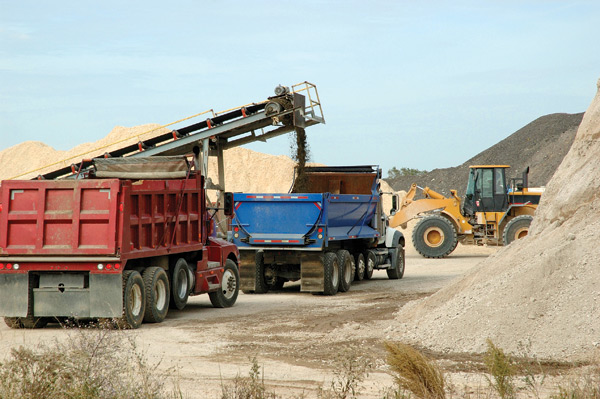Well, just when you thought it was safe to go back on the Oak Ridges Moraine and hike in Ontario’s Protected Greenbelt … the day was Friday, March 29, a sunny cool morning …
There I was riding my trusty old bike in for a spring tune-up at the North Hub Bike Shop on Healey Road when I came across a quiet meeting being held at Bolton’s Hampton Inn.  A small group of environmentally concerned citizens were out in front protesting a meeting going on behind closed doors between politicians and industry representatives, apparently with the goal of opening up the Moraine and Greenbelt to unfettered aggregate extraction. Rumours ran wild.
A small group of environmentally concerned citizens were out in front protesting a meeting going on behind closed doors between politicians and industry representatives, apparently with the goal of opening up the Moraine and Greenbelt to unfettered aggregate extraction. Rumours ran wild.
Those pesky “red tape” items like the Endangered Species Act, and the Clean Water Act, and any Act that might interfere with Doug Ford’s “Open For Business” mantra were said to be on the “exemptions for extractors” list.
In attendance were Caledon’s Mayor Allan Thompson, and Susan Foxton, Mayor of North Dumfries, and Sylvia Jones Minister of Community Safety and Correctional Services (MPP for Dufferin-Caledon), , and John Yakabuski Minister of Natural Resources (MPP for Renfrew-Nipissing-Pembroke), and his Parliamentary Assistant Toby Barrett (MPP for Haldimand-Norfolk), and Steve Clark Minister of Municipal Affairs and Housing (MPP for Leeds-Grenville-Thousand Islands and Rideau Lakes), and Dave Smith (MPP for Peterborough-Kawartha), and a couple of aggregate industry representatives, a few government and corporate staffers, and some police. There was no public admission to these discussions.
That’s 2 Municipal Mayors, 5 Conservative MPPs, 4 Ministers, and aggregate industry lobbyists/representatives behind closed doors in a private meeting in little old Bolton. My spidey senses were tingling, but not having my Press Pass with me, I only talked briefly with the very well behaved “protesters”, let the hotel staff know that I was passing on a hello to our Mayor, and left. On foot. My bike won’t be ready until Tuesday. That I know for sure. What I may never know for sure are the details of that meeting.
Those details should be made public. That is the best way to avoid the ridiculous rumours that back room handshake deals were being concocted at secret meetings. I mean, seriously, what idiots would compromise the integrity of the Greenbelt Act and the sanctity of the Oak Ridges Moraine. Seriously.
But just in case, keep an eye on this one, Caledon. When Schedule 10 was exorcised from Bill 66, I predicted the end runs would begin. At this point, no one knows what was discussed behind closed doors at the Hampton Inn in Bolton, so follow the money. Regardless, the citizens of Caledon need to make crystal clear to government and industry: you can develop and extract all you want … within the strictest of environmental guidelines, honouring that “red tape” that prevents rape and pillage, and protects our waters and land and all species for seven generations to come.
Caledon is Open for Environmentally Literate and Ethical Sustainable Development. Period.
The way I see it.
***
Skid Crease, Caledon
- image from inthehills.ca
 When at the exact moment of the Equinox, my egg snapped to attention, upright and perfectly balanced, almost like a gravitational field had pulled it upright, I was blown away. I became a believer. For every year since on the equinox in spring and fall, I have balanced my eggs.
When at the exact moment of the Equinox, my egg snapped to attention, upright and perfectly balanced, almost like a gravitational field had pulled it upright, I was blown away. I became a believer. For every year since on the equinox in spring and fall, I have balanced my eggs. When the Yellow Vest Convoy rolled across Canada under the disguise of protesting an atmosphere saving price on carbon, every sane citizen in the country should have thrown their bodies across the highways to block the trucks. This climate change denying, xenophobic parade of pollution spewing fossil fools should have been turned back to sink in the tar sands.
When the Yellow Vest Convoy rolled across Canada under the disguise of protesting an atmosphere saving price on carbon, every sane citizen in the country should have thrown their bodies across the highways to block the trucks. This climate change denying, xenophobic parade of pollution spewing fossil fools should have been turned back to sink in the tar sands. The Himalayan glaciers are disappearing at an increasing rate and expected to be gone by the end of the century. This is the tallest mountain range on the planet, the child of a great tectonic plate shift eons ago. The fresh water that flows off these glaciers doesn’t just inspire National Geographic calendars and yuppie expeditions.
The Himalayan glaciers are disappearing at an increasing rate and expected to be gone by the end of the century. This is the tallest mountain range on the planet, the child of a great tectonic plate shift eons ago. The fresh water that flows off these glaciers doesn’t just inspire National Geographic calendars and yuppie expeditions. Schedule 10 was the easy victory. Some would say a planned distraction. Get all of the environmentalists worked up about saving the Greenbelt, and maybe the rest of Ontario will ignore what we’re doing to Energy, Education, Employment, and the Economy in the rest of Bad Bill 66. Ah, those same little “cutting red tape” tricks that The Common Nonsense Revolution used in the days of Harris and Giorno.
Schedule 10 was the easy victory. Some would say a planned distraction. Get all of the environmentalists worked up about saving the Greenbelt, and maybe the rest of Ontario will ignore what we’re doing to Energy, Education, Employment, and the Economy in the rest of Bad Bill 66. Ah, those same little “cutting red tape” tricks that The Common Nonsense Revolution used in the days of Harris and Giorno.